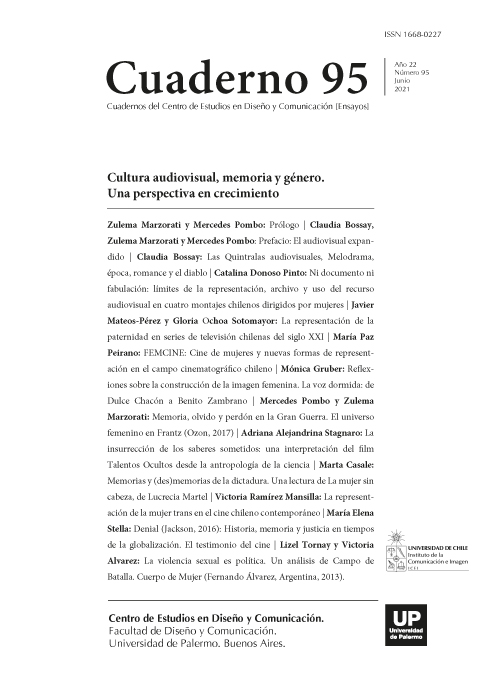FEMCINE: Cine de mujeres y nuevas formas de representación en el campo cinematográfico chileno
Abstract
The Santiago FEMCINE Women's Film Festival is a unique event of its kind in Chile. Created in 2011 by a team of women leaders in the field, it seeks to disseminate and recognize films made by and about women, making their work in the local field of film production more visible. Through its programming, meeting spaces and labour strategies, the festival has contributed to a new positioning of women in the Chilean field as well as to the reconstruction of the cultural memory of a kind of cinema that often remains unrecognized. Based on the systematization of the festival's archives, participant observation and oral testimonies of its organizers, this article gives an account of the role of the festival in the promotion of particular forms of work and ways of understanding women's cinema in Chile. The article considers the political and cultural positioning of FEMCINE, which articulates its programming strategies with its particular forms of collaborative work. It reflects on the ways in which women's film festivals have allowed the promotion and reflection on films made by and about women, as well as the role of women's organizations in the exhibition and construction of new ways of understanding female work, from an inclusive feminist perspective.
References
Carocci, E. (2016) A counterpublic sphere? Women’s film festivals and the case of Films de Femmes. European Journal of Women’s Studies, 23(4), 447–453 Recuperado de. https://doi.org/10.1177/1350506816665726 11 de enero de 2019.
Daza, C. (2018) Women’s film festivals as spaces for learning and advocating for gender equality: the case of FEMCINE (Tesis de Magíster en Education, Gender and International Development). Institute of Education, UCL, Londres.
Harbord, J. (2016) “Contingency, time, and event: An archaeological approach to the film festival”. En de Valck, M., Kredell, B. and Loist, S. Film Festivals: History, Theory, Method, Practice, London: Routledge, 87-100.
Loist, S. (2012) Social Change? The Status of Women’s Film Festivals Today. Charla presentada en el InternationalesFrauenFilmFestivalDortmund|Köln, Köln, Alemania, 17-22 Abril de 2012. Recuperado de http://www.frauenfilm-festival.eu/fileadmin/Bilder/Downloaddateien, 11 de enero de 2019.
Loist, S. (2011) Precarious cultural work: about the organization of (queer) film festivals. Screen, 52(2), 268-273.
Maule, R. (2014) Women’s film festival 2.0 between grassroots globalisation and neoliberal feminism: The Bird’s Eye View Festival. Comunicazioni sociali 3, 368–374.
Peirano, M. P. y Bossay, C. (2018) “Un campo en transformación: cineastas chilenas emergentes”. En Annette Scholz, Marta Álvarez (eds.). Cineastas emergentes: Mujeres en el cine del siglo XXI, 203-226. Madrid: Iberoamericana.
Peirano, M. P. y González, S. (2018), Los Festivales de Cine en Chile (1967-2017). Informe Festivales de Cine en Chile: ventanas de exhibición y difusión del cine chileno. Recuperado de http://www.festivalesdecine.cl, 29 de diciembre de 2018.
Rich, B. R. (2013), The Confidence Game. Camera Obscura: Feminism, Culture, and Media Studies, 28(1), 157–165. doi:10.1215/02705346-2017005
de Valck, M. (2008), Film Festivals: From European Geopolitics to Global Cinephilia. Amsterdam: Amsterdam University Press.
White, P. (2015) Women’s Cinema, World Cinema. Projecting Contemporary Feminisms. Duke: Duke University Press.
Los autores/as que publiquen en esta revista ceden los derechos de autor y de publicación a "Cuadernos del Centro de Estudios de Diseño y Comunicación", Aceptando el registro de su trabajo bajo una licencia de atribución de Creative Commons, que permite a terceros utilizar lo publicado siempre que de el crédito pertinente a los autores y a esta revista.


